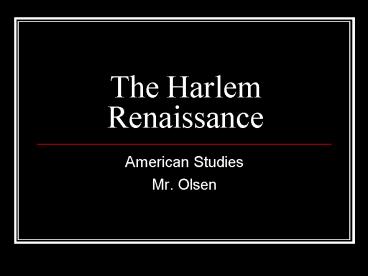The Harlem Renaissance - PowerPoint PPT Presentation
1 / 12
Title:
The Harlem Renaissance
Description:
It's the politics that tells us that we have to think, act, and ... Raised in middle-class Mass.- not aware of racism until ... Born in Jamaica- still ... – PowerPoint PPT presentation
Number of Views:80
Avg rating:3.0/5.0
Title: The Harlem Renaissance
1
The Harlem Renaissance
- American Studies
- Mr. Olsen
2
what weve seen in these last weeks is that
were also up against forces that are not the
fault of any one campaign, but feed the habits
that prevent us from being who we want to be as a
nation. Its the politics that tells us that we
have to think, act, and even vote within the
confines of the categories that supposedly define
us... The assumption that African-Americans cant
support the white candidate whites cant support
the African-American candidate blacks and
Latinos cant come together. .. Dont tell me
we cant change. Yes we can change. Yes we can
heal this nation. Yes we can seize our
future. Yes we can!
From South Carolina speech, 1-26-08
3
Background
- 1863- Emancipation Proclamation
- 1865- Civil War ends
- 1865-1877- Reconstruction
- 1877- Compromise of 1877
- Hays (rep) president, in exchange for end of
reconstruction - 1890s- The nadir- 2000 lynchings
- 1896- Plessey v. Ferguson- Separate but Equal
- 1910s-1950 The Great Migration
- 1918- American involvement in WW I
4
So what to do?
- Imagine yourself as a young, educated African
American in the early 20th century. What would
you do to change whats going on around you? What
would you encourage your community to do?
5
Booker T. Washington-Cast Down Your Bucket
Where You Are
- 1856-1915 (Born a slave in VA)
- 1888- At 25, became president of Tuskegee
Institute - Philosophy was to teach young blacks a practical
trade (plumbing, masonry, carpentry, etc) - 1895- Gives famous Atlanta Compromise speech to
Atlanta Exposition - 1901- Publishes Up From Slavery-
- Immediate hit- becomes first A-A guest to White
House - Urged A-As to work patiently within existing
framework and equality would come.
6
W.E.B DuBoisChange Now
- 1868-1963 (Lived 95 yrs!)
- Raised in middle-class Mass.- not aware of racism
until later childhood - EXTREMELY intelligent- Ph. D. Harvard, studied in
Berlin for several years - Wrote many books, including Souls of Black Folk
in 1903 - Co-founder of NAACP in 1909- Editor in chief of
their journal The Crisis - Theory of Double Consciousness that blacks
simultaneously view themselves through their own
eyes AND ALSO through the lens of racist white
America. - Strongly (and publicly) disagreed with
Washington- believed that SYSTEM had to be
changed in order for blacks to finally gain
equality- and erase this double consciousness.
7
Marcus Garvey- Back to Africa
- 1887-1940
- Born in Jamaica- still national hero there
- Founded Universal Negro Improvement Association
(UNIA) and African Communities League (ACL). - Inspired by B.T. Washington, but was a
segregationist believed that blacks should create
entirely separate (and black-operated) system - Founded Black Star Line and Negro Factories
Corporation - Also started Liberia Project and Back to
Africa movement- encouraged A-As to move to
Liberia to form own country where blacks would
have equal rights - Believer in Racial Purity- that races shouldnt
mix - Had a vicious (and mutual) dislike of Dubois
8
Again, what would you do?
- Reflect for a moment and consider-
- Whose theory makes the most sense to you in the
persona of the young 1920s African American? - Whose theory makes sense to you as yourself?
- Who do think Barack Obama would side with?
9
The New Negro
- middle-class orientation
- demanded their legal rights as citizens
- intrinsic standard of Beauty and aesthetics does
not rest in the white race - African Americans were poised to assert their own
agency in culture and politics instead of just
remaining a "problem" or "formula" for others to
debate about
10
The Harlem Renaissance
- 1919- 1930 (ish)
- flowering of African American art, literature,
music and culture based in Harlem, New York City,
after World War I - Literature Poetry of Langston Hughes and prose
of Zora Neale Hurston - Music Jazz- not called Jazz Age for nothing!
- Art Painters, playwrights, etc.
11
World War I
- "the war to make the world safe for democracy"
- Yet blacks were in segregated units, often given
most dangerous/ worst duties - Exposure to far more tolerant European culture,
e.g. France - Return to Jim Crow South especially intolerable
12
The Great Migration 1910s-1950
- Movement of millions of blacks from the rural
South to urban North - Blacks fleeing repression in Jim Crow South
- Also greater job opportunity in north in
factories- esp. during wartime - Less competition from immigrating Europeans in
wartime































